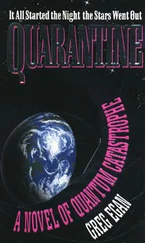‘No,’ Medoro admitted. He buzzed wryly, finally reconciling himself to the strangeness of it. ‘Maybe you should stay clear of this in the debate. It might make people feel a bit… trammelled.’
‘If Ramiro doesn’t raise it, I’ll have no reason to bring it up.’ Agata felt much happier about the whole subject after arguing it out with Medoro, but she wasn’t going to spread anxiety needlessly just to prove to people that she had the cure. ‘It’s going to be hard enough as it is.’
‘You’ll be fine,’ Medoro assured her.
‘Will I?’ Agata pictured herself at the front of the packed meeting room, ready to follow in Lila’s footsteps. Or possibly her brother’s.
‘I’d offer you an eyewitness report of your success,’ Medoro said. ‘But we can’t quite pull that off yet.’
Tarquinia reached across and squeezed Ramiro’s shoulder. Her hand made contact roughly, imperfectly controlled in the near-weightlessness, but that only gave the gesture more force.
‘Good luck,’ she whispered. Ramiro kept his rear gaze on her as he dragged himself away along the guide rope towards the stage.
The meeting room was full, and brightly lit by the beams from a dozen coherers bounced diffusely off the ceiling. People were still talking among themselves as Ramiro approached the front of the stage and reached over to start the timer. He waited a pause or two for the echoing ping to grab their attention, but he knew it would only waste time if he held out for complete silence.
‘My job,’ he began, ‘is to automate things. There are many tasks where we already know exactly what we want to achieve, but find it too arduous to supervise the execution of our plans in detail. If I do my job well, though, the results are easy to foresee: you tell me what you want some machine to do for the next five stints, and I make that happen.
‘So I’m familiar with the advantages of control and predictability , and I can understand why the Council aspires to bring those qualities to as many aspects of the running of the Peerless as possible. If we could receive a message from the future assuring us that the mountain had reached the home world safely, and this message was accompanied by a list of the actions we’d need to take – or in the sender’s view, had already taken – to sidestep a host of potential calamities, then I’d have no complaint about that at all.’
Ramiro let himself scan a few faces in the audience; so far, he didn’t seem to have offended anyone.
‘The problem,’ he continued, ‘is that if we build the proposed system, I don’t believe it would be possible to limit it to a single, clear-cut purpose like that. Whatever the Council decrees for now, they can’t control the way the facility would be used in the future. In practice, what will confront us is the photonic equivalent of a vast storehouse of documents whose content will have been determined by other people, some of them very remote from us in time. Over the generations, certain documents will have been removed – another process that will be out of our hands – while others are kept and passed down to us. If we hope to reap any benefit from whatever remains, we’ll have no choice but to appoint people to read and assess everything we receive. But people can’t forget things on command, and even people sworn to secrecy can’t ignore what they know. With all those messages and all those readers, information will spill out and reach the public, whether they want it or not.
‘Stories of distant calamities averted might bring us courage and optimism, but how would we respond to details of our own personal fates? Some bad news might well come through to us that serves no useful purpose at all: who would want to hear of an early death that no warning could prevent? And some good news would surely lose its lustre if revealed at the wrong time: look back on all the joyful surprises in your own lives, and ask yourselves if you really would have wished to be confronted with a list of them, years in advance. And even if you succeeded in remaining ignorant, how would you feel if your friends and rivals knew your future history? People might be compelled to seek as much news about themselves as possible – in spite of their original wishes – simply to prevent others—’
The timer rang. Ramiro was startled; his pacing must have been slower than when he’d rehearsed with Tarquinia the night before. He flipped the lever and dragged himself back towards the rear of the stage. He’d barely registered Agata’s presence before, but now he forced himself to stop fretting about his poor timing and focus all his attention on her.
‘Ramiro has done me the favour of acknowledging the enormous benefits of this scheme,’ Agata began. ‘But he’s been rather vague about the details, so let me try to make the possibilities more concrete. Imagine receiving a message from the future telling us that one of the medicinal gardens had become infested with a species of goldenrod blight that we’d never encountered before. Unwelcome news, of course, and we’d be powerless to prevent it – but now imagine that message going on to explain that, thanks to this early warning, we would isolate all the other gardens in time to keep them safe.
‘I’m not saying that this system would be a panacea, but we could all make a list of dozens of tragic events where a warning would make all the difference. Imagine encountering some uncharted rock from the home cluster, crossing our path at infinite speed and wiping out a fire-watch platform – but missing the Peerless itself, thanks to a course correction that only a message from the future could have guided. Indeed, we could surround the mountain with expendable objects, purely for the sake of rendering near misses visible – just as that one blighted garden allowed us to save the rest.’
Ramiro thought it more likely that consistency would be achieved by the rock simply destroying the Peerless , leaving no one to report on the event. But since he doubted that either kind of collision would actually occur, if he quibbled about it he’d just sound desperate.
Agata had moved on. ‘All this talk about information bursting from the system and spilling down the corridors is fanciful. Has Ramiro never heard of encryption? If it’s good enough to protect our privacy now, why should we expect it suddenly to fail us? If there are messages from our future selves, we’ll be free to use all the protocols we use now when exchanging confidences with friends to ensure that no one but our present selves can read them – and of course, we’ll also be free to delete these messages unread if we choose to, strange as that would be. With the same methods, we can guarantee the privacy and authenticity of messages from our descendants, or indeed from anyone in the future who chooses to address us. So there’ll be no swarm of prying clerks sifting through our private mail, gossiping about us to their friends. Matters of public interest will be sent in plain text, but everything else will be person-to-person.
‘For those rare cases where some future informant and present-day recipient might act together out of spite to violate your wish not to be informed of certain events, we can discourage that with appropriate punishments. Nobody is claiming that this technology will transform us into a flawless society, but people have survived over the ages without any perfect, pre-emptive cure for hurtful gossip or malicious slander. Words can damage people, I acknowledge that, but it’s nothing new. We’ll find the right balance in our laws to protect against the worst kinds of harm, just as we’ve done in the past.’
Agata had been stealing glances at the timer with her rear gaze and adjusting her pace. Now she waited a moment for it to start ringing, then reached down to silence it.
Читать дальше










